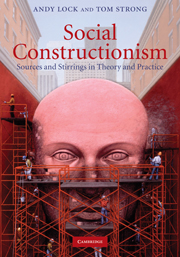Book contents
- Frontmatter
- Contents
- Preface
- Acknowledgements
- 1 Introduction
- 2 Giambattista Vico
- 3 Phenomenology
- 4 Hermeneutics
- 5 Marxism and language
- 6 Lev Vygotsky
- 7 Meanings and perspectives
- 8 Ludwig Wittgenstein
- 9 Gregory Bateson
- 10 Sociologies – Micro and Macro
- 11 Sources of the self
- 12 Michel Foucault and his challenges
- 13 Discourse analysis
- 14 Ken and Mary Gergen
- 15 Rom Harré
- 16 John Shotter
- 17 Concluding remarks
- Bibliography
- Index
13 - Discourse analysis
Published online by Cambridge University Press: 05 June 2012
- Frontmatter
- Contents
- Preface
- Acknowledgements
- 1 Introduction
- 2 Giambattista Vico
- 3 Phenomenology
- 4 Hermeneutics
- 5 Marxism and language
- 6 Lev Vygotsky
- 7 Meanings and perspectives
- 8 Ludwig Wittgenstein
- 9 Gregory Bateson
- 10 Sociologies – Micro and Macro
- 11 Sources of the self
- 12 Michel Foucault and his challenges
- 13 Discourse analysis
- 14 Ken and Mary Gergen
- 15 Rom Harré
- 16 John Shotter
- 17 Concluding remarks
- Bibliography
- Index
Summary
It can be easy to look past the primary activity of professional helping, discourse, to account for what ‘really goes on’ in bringing about human change. Some of this is because the dominant view of human discourse (including conversation) has been based on a ‘conduit metaphor’ of information transmission and reception (Lakoff and Johnson, 1980). Things can get even more confusing when considering discourse in its noun and verb forms. As a noun, scholars and practitioners point to systematized differences in the meanings people use for making sense of and communicating their experiences. Others favour a pragmatic, verb-like sense of discourse, as things people do in and with their developing communications with each other (Levinson, 1981). For most discourse analysts, looking at language alone (the noun stuff) is not enough; one needs to see also how language is used, and what results from that use. At the heart of our considerations of professional helping is how discourse used for understanding (noun-like language) can at the same time be used for social influence (in verb-like dialogues).
Discourse is what we use to understand and influence each other. As anyone travelling to a foreign country finds out, without a shared means of understanding and communicating social life becomes a huge challenge. Discourse is ‘already there’ for us most of the time, we grow up with it being used around us, and one of our most important challenges is to learn to use it effectively with each other.
- Type
- Chapter
- Information
- Social ConstructionismSources and Stirrings in Theory and Practice, pp. 269 - 294Publisher: Cambridge University PressPrint publication year: 2010



